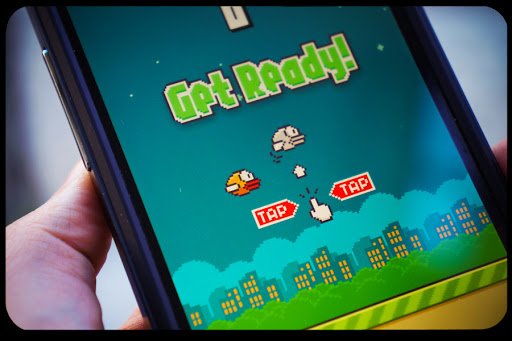50 million downloads. 47,000 reviews. $50,000 per day in ad revenue. It was the number one most downloaded app in both the App Store and Google Play for weeks. That is, until it was suddenly removed by its creator.
If you’ve somehow missed the extraordinary phenomenon that is Flappy Bird, here’s what it is: You tap your phone’s screen to control a bird, trying to guide it through open spaces between green Mario Brothers-esque tubes without running into anything. It’s impossible to “win” in the ordinary sense of the term: there are no levels and, as far as anyone knows, no end. You simply see how far you can get until you inevitably run into something and die.
That’s it (it’s much harder than it sounds). Vietnamese video game developer Dong Nguyen says he single-handedly coded it in just a few nights after work last spring. But now it’s gone. If you don’t already have it and want to check it out for yourself, you’ll need to find a friend who has it or else shell out tens of thousands of dollars on eBay for a phone with it.
What’s perhaps most surprising about the story, though, is the reason Nguyen gives for why he took the game down. In an interview he gave to Forbes in a Hanoi hotel room, he explains:
Read that again. One of the most successful apps ever was taken down from app stores by its creator because he was worried it was too addictive (isn’t that what video game developers want?) and hurting people’s lives. The Forbes article continues:
Whether Flappy Bird really is that dangerous is beside the point. Nguyen thought that it was and decided that limiting its spread was more important than making more money – and for that, he should be counted as a hero!
Yes, he’s still raking in ad revenue from existing players, but he’s followed his conscience to repudiate one of the most widespread but destructive principles of capitalism: that when it comes to determining the morality of exchange, consent is the sole criterion of the good (as Mark Shea puts it).
From pornography to cigarettes, if people buy your product voluntarily, so the thinking goes, you’re free and clear. After all, your customers chose to buy it! It’s on them! Shouldn’t people be held accountable for their personal choices? Yes, but that includes you if you are selling the destructive product. If it’s destructive, they shouldn’t be buying it, but perhaps you shouldn’t be selling it either.
The Catholic Church has always taught that, whether it be money, sex, or anything else, consent alone is not enough to render an exchange moral. Consent is obviously important, but our responsibility to our fellow man is not fulfilled simply by ensuring that our neighbor is acting voluntarily. No, we are called to love our neighbor, and to love means to will our neighbor’s good – which is often not the same as what our neighbor wants (or is willing to consent to).
This now rich and famous programmer from Vietnam has not only surprised the whole mobile gaming industry and generated one of the most fascinating stories of the year, he’s set an important example: it’s possible to choose the good of others over money. I hope we Americans are listening.
Brantly Milleganis an Assistant Editor for Aleteia. He is also Co-Founder and Co-Editor of Second Nature, Co-Director of the International Institute for the Study of Technology and Christianity, and is working on a M.A. in Theology at the St. Paul Seminary School of Divinity. He lives with his wife and children in South St. Paul, MN. His personal website is brantlymillegan.com.

